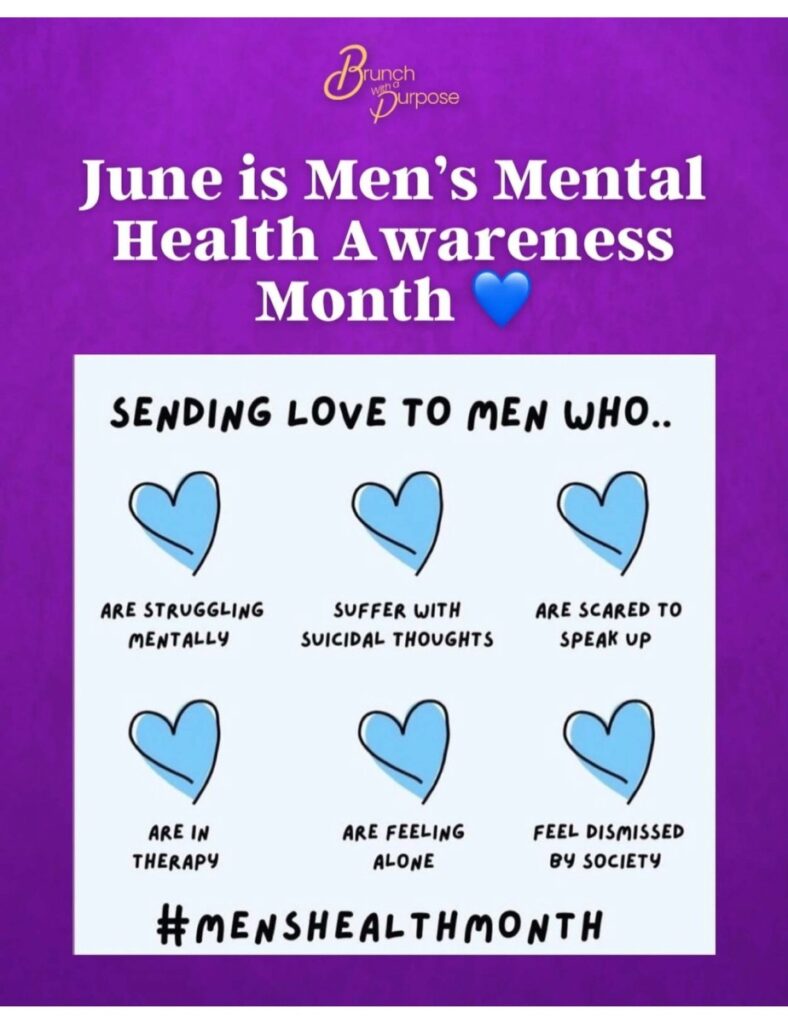1 / 3 Show caption + Hide caption – June is Men’s Mental Health Month, an important time to address and raise awareness of the mental health challenges faced by men, especially those who are military. (Photo credit: Provided) View original 2 / 3 Show caption + Hide caption – Infographic showing the number of male suicides and the need for men to talk about mental health. (U.S. Air Force graphic by Senior Airman David Linn) (Photo credit: Senior Airman David Linn) View original 3 / 3 Show caption + Hide caption – June is Men’s Mental Health Month, an important time to address and raise awareness of the mental health challenges faced by men, especially those who are military. (Photo credit: Provided) View original
KAISERSLAUTERN, Germany – The month of June marks several important anniversaries, including Pride Month, Juneteenth and Army Heritage Month. However, many may not know that June is also Men’s Health Awareness Month. Recognized by Mental Health America (MHA), the anniversary highlights that June is an important time to address and raise awareness of the mental health challenges faced by men, especially those in the military.
The 2023 National Veterans Suicide Prevention Annual Report revealed that the suicide rate among veterans is 1.5 times higher than the general population. This alarming statistic highlights the critical issue of suicide being the second leading cause of death among veterans under the age of 45.
A 2023 study from the University of Texas at San Antonio focused on suicide rates among veterans of post-9/11 conflicts and revealed several key findings.
Veterans who had experienced a traumatic brain injury (TBI) had a higher suicide rate than those who had not. The highest suicide rates were among veterans ages 35-44, followed by those ages 25-34. Native American, Asian/Pacific Islander, and veterans who had experienced a TBI were identified as groups with higher suicide rates.
Since 2018, there has been an increase in suicides among post-9/11 veterans, which has been blamed on increased mental illness diagnoses, substance abuse and easier access to firearms.
The study also found that 31% of veteran suicides were among people under the age of 49, and 69% were among people over the age of 50. In states that reported sex-disaggregated data, approximately 97% of veteran suicides were male.
There are stark disparities in suicidal ideation and suicide completion rates among marginalized groups, including LGBT military personnel. LGBT active duty military and veterans have been found to be two to three times more likely to have suicidal ideation. Alarmingly, transgender veterans have suicide rates twice as high as their cisgender peers.
Recognizing and discussing suicidal thoughts can significantly reduce the risk of suicide. It is crucial to recognize the warning signs of a mental health crisis. These can include expressing feelings of hopelessness or that life has no meaning, withdrawing from friends, family and activities, letting go of possessions or making final preparations, increased alcohol or drug use, overwhelming sadness or emotional numbing.
One of the main barriers to accessing mental health care is the stigma associated with mental health issues. This stigma is especially prevalent among military personnel, who may see asking for help as a sign of weakness. However, mental health is just as important as physical health, and addressing mental health issues shows strength and resilience.
Stigma and lack of access to mental health care prevent many male soldiers, civilians and veterans from seeking the help they need. But asking for help is a sign of courage. Most VA clinics, Army substance abuse programs and crisis lines offer resources and mental health care referrals, and many options are available online.
Leadership within the military community plays a key role in mental health efforts. Commanders and senior leaders can create an environment where talking about mental health is normal and encouraged. Peer support is also important. Fellow soldiers and coworkers play a key role in recognizing the signs of a mental health crisis and encouraging those who need help to seek it.
Increasing service members’ resilience requires providing them with the tools and resources to manage stress, build strong support networks, and develop coping strategies. Programs such as Comprehensive Soldier and Family Fitness (CSF2) and the Army Resilience Directorate provide training and resources to improve the overall well-being of soldiers and their families.
Comprehensive mental health care involves addressing the underlying issues that cause mental health issues, not just the symptoms. This includes treating conditions such as PTSD, depression, anxiety and substance abuse. Integrating mental health care with primary care services ensures that soldiers and veterans receive comprehensive treatment tailored to their individual needs.
In celebration of Men’s Mental Health Awareness Month, USAG Rheinland-Pfalz encourages everyone to look out for one another and foster open conversations about mental health. Together, we can create a supportive environment where asking for help is seen as a courageous step towards recovery and wellness.
For additional information regarding resources related to mental health and suicide prevention, contact the USAG Rhineland-Palatinate Army Substance Abuse Program (DSN 541-1524).
If you or a loved one needs help, here are some additional resources:
While stationed in the 48 contiguous states, service members, veterans, and their families experiencing a crisis can seek help through the Veterans/Service Members Crisis Line in the following ways:
• Call 988 and access option 1.
• Text us to 838255.
• Chat at VeteransCrisisLine.net/Chat.
If you are based outside the U.S., you can access the Crisis Line by:
• In Europe call 00800 1273 8255 or DSN 118.
• In Japan and Korea, call 080-855-5118 or DSN 118.
• In Afghanistan dial 1-800 273-8255 or DSN 111.
To access non-crisis support, service members and their loved ones can connect with Military OneSource for free, confidential counseling. Mental health and counseling services are also available through Tricare.
DOD civilian employees can access resources, information and confidential support by calling 1-866-580-9046.
USAG Rheinland-Pfalz serves, supports, and protects the integrated force community enabling power projection in the European Theater.

